If high-school government class taught us anything, it was that getting bills passed through Congress was a game of numbers: The bills with the most votes win. Turns out it’s not that simple. These days, the polarized state of American politics means that major bills need at least 60 votes to avoid an inevitable filibuster by the opposition. Political scientist Gregory Koger‘s new book Filibustering: A Political History of Obstruction in the House and Senate addresses the institutionalization of the filibuster — and describes congressional loopholes by way of which fast thinking and hard work can beat the numbers. Koger teaches American politics at the University of Miami. He joins host Terry Gross for a conversation about what has happened to simple majority rule. ALSO, Historian Garry Wills won a Pulitzer Prize in 1993 for his book Lincoln at Gettysburg: The Words That Remade America and now he’s back with a new book about how the atomic bomb transformed our nation. Bomb Power: The Modern Presidency and the National Security State explores the ways in which the bomb helped expand the power of the American presidency and turn the United States into a national security state. Wills is a cultural historian and adjunct professor at Northwestern University. He has won multiple National Book Critics Awards and writes for The New York Review of Books.
This week Jim and Greg conduct one of their patented Classic Album Dissections. They decided to focus on a landmark album in indie rock: Doolittle by 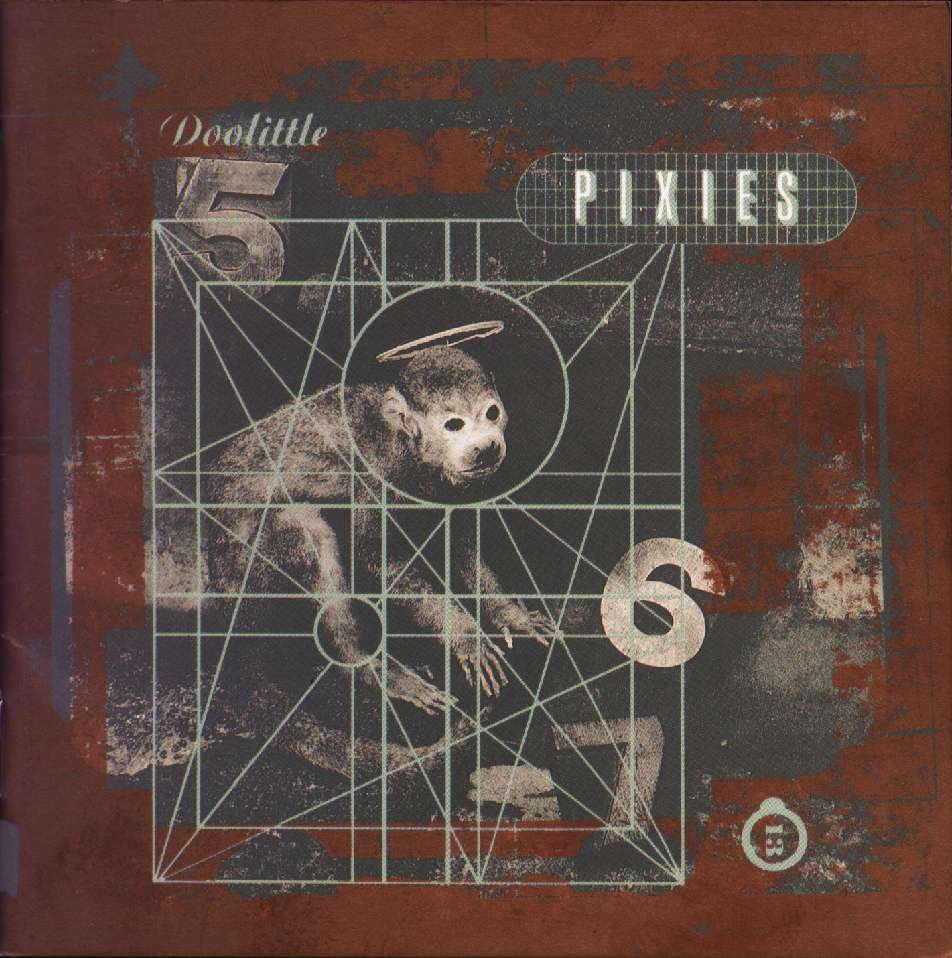 The Pixies. As an added bonus, they’re joined by one of the creators of Doolittle, Pixies singer and songwriter Charles Thompson aka Black Francis aka Frank Black. Charles and bandmates Kim Deal, Joey Santiago and David Lovering recently marked the album’s 20th anniversary with a tour dedicated to the record. While artists such as Kurt Cobain have cited it as a major influence, Doolittle was a slow burn record. After its 1989 release, it didn’t achieve gold status until almost a decade later. As Charles explains to Jim and Greg, his vocal style and lyrics were an amalgamation of his upbringing and the art and ideas floating around him at that time. It’s a unique mix of preaching, surrealism and even sexual frustration. But, the songwriter warns against dissecting the lyrics too closely. He loves words for words’ sake. The lead singer also credits producer Gil Norton for the mix of “raw and fancy” that people associate with The Pixies. He polished up their sound, but knew well enough to leave a little roughness around the edges. Another component of the sweet but scary mix is Joey Santiago’s guitar playing. Charles describes it as just like the guitarist’s own personality—sweet and gentle like a little kid, but capable of smashing something to bits. At the end of their discussion Jim and Greg ask Charles/Black/Frank to choose a favorite track from Doolittle. He goes with “Monkey Gone to Heaven,” a song that encapsulates all of the album’s elements—humor, darkness, violence, love, hope and references to the nautical and the mythological. Finally, Charles sees it as a great example of the yin and yang connection between him and singer Kim Deal.
The Pixies. As an added bonus, they’re joined by one of the creators of Doolittle, Pixies singer and songwriter Charles Thompson aka Black Francis aka Frank Black. Charles and bandmates Kim Deal, Joey Santiago and David Lovering recently marked the album’s 20th anniversary with a tour dedicated to the record. While artists such as Kurt Cobain have cited it as a major influence, Doolittle was a slow burn record. After its 1989 release, it didn’t achieve gold status until almost a decade later. As Charles explains to Jim and Greg, his vocal style and lyrics were an amalgamation of his upbringing and the art and ideas floating around him at that time. It’s a unique mix of preaching, surrealism and even sexual frustration. But, the songwriter warns against dissecting the lyrics too closely. He loves words for words’ sake. The lead singer also credits producer Gil Norton for the mix of “raw and fancy” that people associate with The Pixies. He polished up their sound, but knew well enough to leave a little roughness around the edges. Another component of the sweet but scary mix is Joey Santiago’s guitar playing. Charles describes it as just like the guitarist’s own personality—sweet and gentle like a little kid, but capable of smashing something to bits. At the end of their discussion Jim and Greg ask Charles/Black/Frank to choose a favorite track from Doolittle. He goes with “Monkey Gone to Heaven,” a song that encapsulates all of the album’s elements—humor, darkness, violence, love, hope and references to the nautical and the mythological. Finally, Charles sees it as a great example of the yin and yang connection between him and singer Kim Deal.
RAWK TAWK: Burying The Hatchet With Black Francis
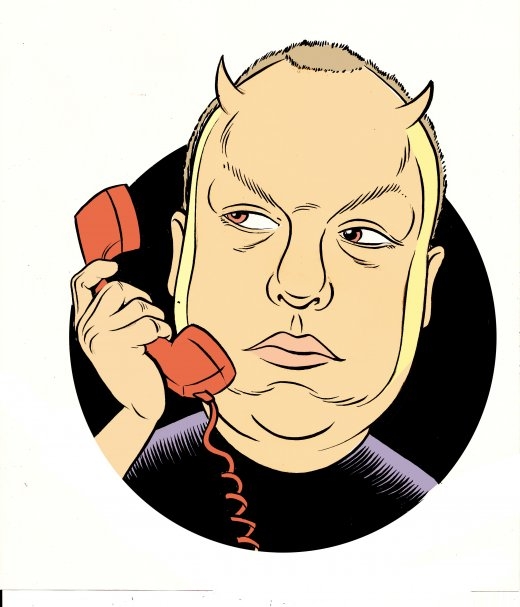
[Illustration by ALEX FINE]
![]() BY JONATHAN VALANIA Set the Wayback Machine to 1988. I’m a college radio DJ stranded in the middle of Pennsyltucky. Entranced by the naked boob on the cover of Surfer Rosa, I slap it on the turntable and…the Pixies had me by the first 10 seconds of “Where Is My Mind?” and never really let go. Shortly thereafter I got a gig working for a Pennsyltucky daily. They asked me one day if I wanted to interview some guy named Black Francis from the Pixies. Would I? Man, this was a dream come true! I could finally learn the WTF of lyrics like, “He bought me a soda, he bought me a soda/ And he tried to molest me in the parking lot.”
BY JONATHAN VALANIA Set the Wayback Machine to 1988. I’m a college radio DJ stranded in the middle of Pennsyltucky. Entranced by the naked boob on the cover of Surfer Rosa, I slap it on the turntable and…the Pixies had me by the first 10 seconds of “Where Is My Mind?” and never really let go. Shortly thereafter I got a gig working for a Pennsyltucky daily. They asked me one day if I wanted to interview some guy named Black Francis from the Pixies. Would I? Man, this was a dream come true! I could finally learn the WTF of lyrics like, “He bought me a soda, he bought me a soda/ And he tried to molest me in the parking lot.”
When I got him on the phone, he was no doubt bone-tired from endless touring and weary of answering stupid fanboy questions. He insisted I call him Charles and pretty much refused to give me a straight answer to any question, especially when it came to Kim Deal. “Who cares?” he’d say. “We just try to make cool rock music.” I remember thinking: what a dick.
Twenty years later, I call him up and we talk about dope, minotaurs, his favorite Pixies song, Samson & Delilah, makin’ babies, breakin’ kneecaps, the soon-to-be announced Doolittle 20th Anniversary tour, why the 80’s won’t die and his least favorite Pixies song. Afterwards it occurs to me that Black Francis was right all along. All that soap opera jive? All that he said/she said bullshit? What does it really matter in the end? Especially when the only thing worth remembering is this: If man is five, then the Devil is six and God is seven. Or to put it another way, the Pixies were just four kids from Boston trying to make cool rock music whose monkey died and went to heaven.
PHAWKER: We’re doing this interview ostensibly about the Minotaur box set so the first bunch of questions will be Pixies related I hope that’s cool with you.
CHARLES THOMPSON: Yeah.
PHAWKER: So first of all, let’s start with why is it called Minotaur?
CHARLES THOMPSON: I don’t know. Is it some sort of bull that we’re talking about?
PHAWKER: I think the Minotaur is sort of half man, I guess, half-bull—yeah.
CHARLES THOMPSON: So yeah that seems like an appropriate kind of image for the Pixies you know kind of surreal, you know, animalistic, you know, strange it’s definitely true to the kind of imagery that Vaughan Oliver has presented as a representation of the band. And he’s the only person outside the band that I would allow kind of to represent this band, so to speak. No one else has done that, it’s always been him. This is his title.
PHAWKER: This is essentially all the studio recordings in sort of a superior acoustic version with new artwork. There’s no actual new songs, correct?
CHARLES THOMPSON: No new songs and there’s nothing remastered either. We decided not to do that either. We wanted to stand by the original recordings as we released them. That was our artistic statement.
PHAWKER: On this day in 2009 if I asked you out of the blue what’s your favorite Pixies song?
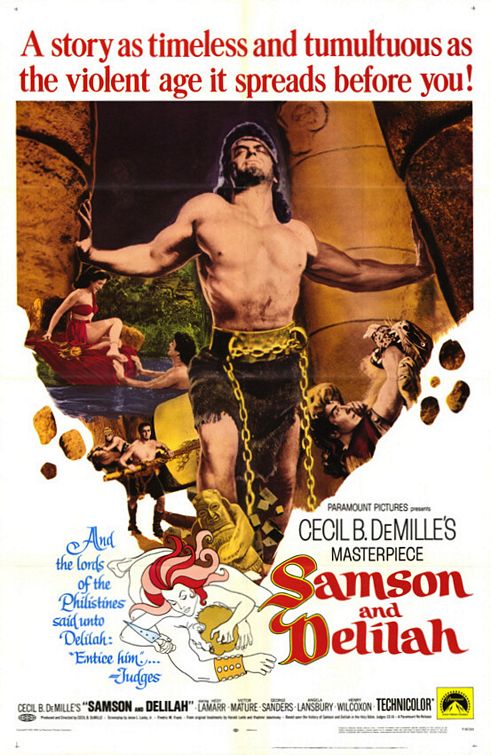 CHARLES THOMPSON: Probably “Gouge Away.” It’s the chord progression—it’s a five-chord chord progression. Well it’s not five chords I take that back it’s only three chords actually but played in a five-bar pattern. So that kind of non-square vocabulary essentially I have strived for and if I can get away with it without sounding awkward I think I can really pull it off. And that song really pulls it off. The only difference chord-wise between the choruses and the verses of that song is in the verses there’s a chord that switches from a minor to a major so there’s a subtle difference between the two but essentially the same root note. There’s something nice about that that I really like; I like the subject matter. It’s a song about Sampson and Delilah you know, that’s Old Testament. I felt that subject was appropriate for a rock and roll song. Especially since rock and roll was born of blues and gospel music.
CHARLES THOMPSON: Probably “Gouge Away.” It’s the chord progression—it’s a five-chord chord progression. Well it’s not five chords I take that back it’s only three chords actually but played in a five-bar pattern. So that kind of non-square vocabulary essentially I have strived for and if I can get away with it without sounding awkward I think I can really pull it off. And that song really pulls it off. The only difference chord-wise between the choruses and the verses of that song is in the verses there’s a chord that switches from a minor to a major so there’s a subtle difference between the two but essentially the same root note. There’s something nice about that that I really like; I like the subject matter. It’s a song about Sampson and Delilah you know, that’s Old Testament. I felt that subject was appropriate for a rock and roll song. Especially since rock and roll was born of blues and gospel music.
PHAWKER: Now there’s a reference to marijuana in that song. Samson and Delilah were stoners?
CHARLES THOMPSON: The story of Samson and Delilah is when he finally meets the end he’s held captive by the Philistines and they have a party for three days so they just party for three days with him chained up. I don’t know what the Philistines were smoking when they had a three-day party — if it wasn’t marijuana, I’m sure it was something else. I think that the first peoples to have smoked marijuana were the Mediterranean people or the Italians. It’s not that unknown in that part of the world. I mean, fuck, that they were partying for three days.
PHAWKER: Back in The Pixies you were known as quite the avid pot smoker and I’m wondering if you’re still a fan and what your feelings are on legalization or the possibility that it may be happening sometime soon.
CHARLES THOMPSON: You know I have mixed feelings about it. I love the way that it smells, but I don’t smoke  it anymore. I never wrote a song under the influence of it or did anything of value under the use of marijuana other than parallel park. I don’t necessarily recommend it as a lifestyle for anybody. I think that a lot of people are probably able to do things in moderation, but I’m not that sort of moderate person which is why I had to stop smoking. I couldn’t even buy it in moderation. I thought ‘oh I think I’ll buy some pot’ and instead of a little baggie, I bought a couple of pounds. It wasn’t really serving me in any positive way. I don’t think it set me down a path of self-destruction, it was just inhibiting me in a way so I just got it out of my life. I don’t know. Other people certainly have had positive experiences with it, and I don’t think it should be illegal per se. It seems a little ridiculous to make it illegal considering how prevalent it is.
it anymore. I never wrote a song under the influence of it or did anything of value under the use of marijuana other than parallel park. I don’t necessarily recommend it as a lifestyle for anybody. I think that a lot of people are probably able to do things in moderation, but I’m not that sort of moderate person which is why I had to stop smoking. I couldn’t even buy it in moderation. I thought ‘oh I think I’ll buy some pot’ and instead of a little baggie, I bought a couple of pounds. It wasn’t really serving me in any positive way. I don’t think it set me down a path of self-destruction, it was just inhibiting me in a way so I just got it out of my life. I don’t know. Other people certainly have had positive experiences with it, and I don’t think it should be illegal per se. It seems a little ridiculous to make it illegal considering how prevalent it is.
PHAWKER: Can you recall the last time you smoked marijuana?
CHARLES THOMPSON: I don’t think I remember. Probably six or seven years ago. I think I was smoking a little bit of it mixed with tobacco, in the European fashion. Even in that time it wasn’t like I was baked out of my mind. Frankly, it was the tobacco that was getting me more messed up than the marijuana. I realized I wasn’t craving the marijuana, it was the tobacco I was craving — so I just stopped. I was just like ‘What am I doing? I’m not 25 years old anymore.’
PHAWKER: What would be your least favorite Pixies song?
CHARLES THOMPSON: Maybe that song “Manta Ray.” I don’t hate it or anything. It was a little too sing-songy or something. It sounds like a kids cartoon theme song or something. It doesn’t really appeal to me. When I write
a song I sort of just go with it, I don’t really fight it. I just kind of see it through to the end.
PHAWKER: There was talk of the Pixies recording a new album back in 2007. And it’s unclear to me whatever came of that.
CHARLES THOMPSON: Me too. I don’t know what came of that; I can’t say it’s a hot topic of discussion and I can’t say that it’s not a topic of discussion either.
PHAWKER: So you’re saying it hasn’t happened yet but that’s not to say it might not happen down the line.
CHARLES THOMPSON: If it happens, it happens. I won’t say it’s consuming my life because I got five kids to worry about.
 PHAWKER: Are there any plans for the Pixies to play live in the near future?
PHAWKER: Are there any plans for the Pixies to play live in the near future?
CHARLES THOMPSON: We are playing shows throughout the year.
PHAWKER: In America?
CHARLES THOMPSON: Yeah. I mean things haven’t been booked but things are being discussed within these borders. And it’s our 20th anniversary of the Doolittle record. So we are doing some Doolittle shows where will be playing all of Doolittle plus b-sides. We have a surprise but I don’t want to give away the surprise: Wwe’re putting together kind of a themed show. It’s kind of what has happened with a lot of rock music that’s been around for a while and the people that made it are still performing. So when you play your old music fans sort of like that — ‘oh I get to go see my favorite band and they play my favorite album in sequence!’ It’s sort of a customized show.
PHAWKER: So that’s the plan: Play some gigs where you play the Doolittle album from beginning to end and all the b-sides from that era?
CHARLES THOMPSON: Correct.
PHAWKER: You know it’s kind of funny, I interviewed you for the first time when Doolittle came out and I was just beginning in rock journalism. Man, I can’t believe it’s been 20 years!
CHARLES THOMPSON : Oh my gosh that is really funny! That is bizarre. We did an interview 20 years ago.  Gosh, am I the same person or do I sound totally different?
Gosh, am I the same person or do I sound totally different?
PHAWKER: You’re a little different. Back then, I think you were tired – it was when you guys were breaking huge and I think you guys had been on the road forever. I think I asked a lot of really stupid fan boy questions — you know the kind of ‘What’s it all mean?’ questions that you didn’t seem too interested in answering. Looking back I think you were right.
CHARLES THOMPSON: I apologize.
PHAWKER: I apologize for my stupid fan boy questions. So we’ll call it even.
PHAWKER: So tell me about this incident last year you were trying to do a play out in a public square in Dublin and you got arrested?
CHARLES THOMPSON: I orchestrated on my tour that I would go out and do a ‘pre-core’ — my little pun on the notion of encore — and I would appear in the city streets on an agreed upon time and place and announce it on the Internet. But in Dublin it was like a party and it just sort of spiraled out of control for about half an hour. It was kind of ridiculous, like I was Prince or something. I mean half the people there didn’t even know who I was. They were just like, “What’s going on man? What’s all the hoopla about?” So I kind of got kicked out of there because I was blocking traffic. It was sort of surreal and sort of unexpected.
PHAWKER: And you were going to do something similar in London but the cops thought a similar reaction would happen?
CHARLES THOMPSON: Yeah they thought the same thing was going to happen which I don’t think it would have. I guess they were worried about traffic control.
PHAWKER: That always makes the authorities nervous when large groups of people suddenly gather.
CHARLES THOMPSON: They were worried they’d have loads of cars crashing into buses and buses crashing into the crowd of people standing in the middle of the street — all for some guy playing a song on an acoustic guitar.
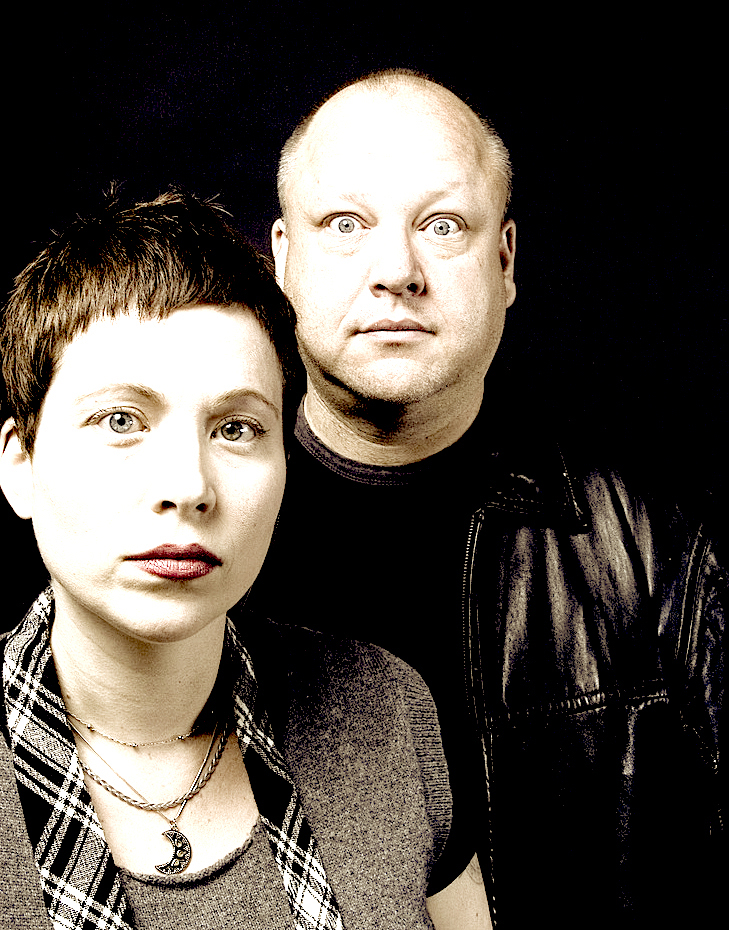 PHAWKER: So let me ask you about Grand Duchy, which is a collaboration between you and your wife Violet Clark — by the way, the tracks that I’ve heard sounded pretty cool. There’s a great quote about the project from you that I read somewhere, something to the effect of “She loves the 80s and in the Pixies we were trying to kill the 80s.” Being someone that was around during the 80’s I understand that notion, and have a harder time understanding young people’s fascination with that time. I mean, I was there, it wasn’t that cool. Do you find that today’s hip young people fetishize the 80s and you just wonder how could they care?
PHAWKER: So let me ask you about Grand Duchy, which is a collaboration between you and your wife Violet Clark — by the way, the tracks that I’ve heard sounded pretty cool. There’s a great quote about the project from you that I read somewhere, something to the effect of “She loves the 80s and in the Pixies we were trying to kill the 80s.” Being someone that was around during the 80’s I understand that notion, and have a harder time understanding young people’s fascination with that time. I mean, I was there, it wasn’t that cool. Do you find that today’s hip young people fetishize the 80s and you just wonder how could they care?
CHARLES THOMPSON: No, that sort of the way of pop culture, especially on the rock side of things. I mean look at classical music – I don’t know what I’m talking about here – the classical music probably never really..it changed very slowly, from what I understand. Now we’ve got this music format that for some people coincides with fashion which changes at least ever year. But the music really has its roots, doesn’t it? I would imagine there are a lot of things that are similar about the rock music today and rock music in 1967. There’s probably more similarities and than there are differences. It’s hard to create something that is totally new. These days, I embrace the notion of being derivative, I embrace nostalgia. Also, irony is a big part of vocabulary in pop culture. Like you said, it’s about turning another time period into a fetish and turning something uncool into something cool — just because enough people say it is.
PHAWKER: This notion of originality must be incredibly frustrating to people making rock music in 2009, given how hard it is to create something new that isn’t derivative. But if you take rock music and look at it as folk music
where it’s sort of the whole point to take what’s’ come before and sort of reinterpret it, I think that can be very liberating creatively.
CHARLES THOMPSON: That’s a good point. Of course, poor old Jimmy Page and Bob Dylan got a lot of
shit over the years for kind of stealing from other performers, from other songs, and not really getting any credit where credit is due. While that’s true but that’s kind of not all of the information. What I feel like doesn’t really get mentioned enough is that’s sort of what was going on in the folk scene in the 1950’s; they all wrote their own
songs; they just kind of changed other people’s songs it a bit and made them their own. Those guys, all the Bob Dylans and Jimmy Pages are from that generation so for them it’s just kind of like second nature. Having said that, they became quite tuned into the concept of intellectual property and having copyright. And of course someone like Bob Dylan, you know, he sort of popularized the concept of writing your own song and tune. It was a different world back then, it was way more cut throat back then; all those guys had hard-ass managers — not that I’m accusing of them being criminals or anything, it was just a different world.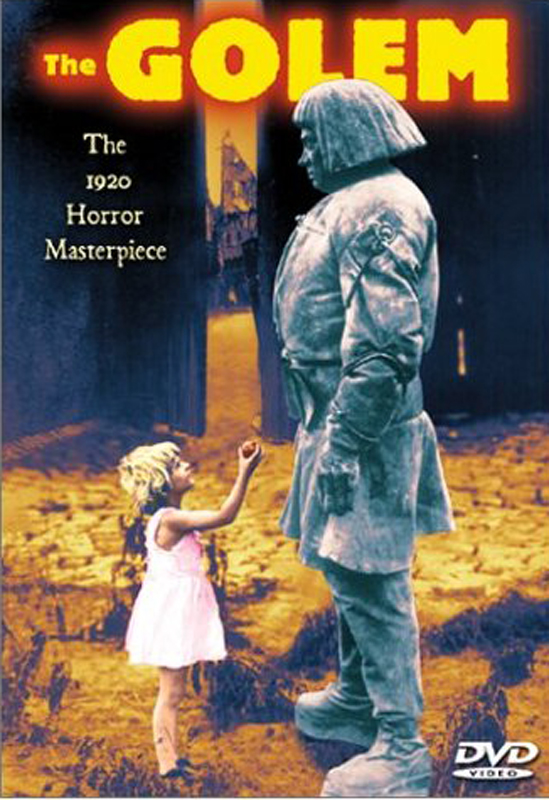
PHAWKER: They were knee breakers.
CHARLES THOMPSON: Yeah, knee breakers.
PHAWKER: Back to Grand Duchy. I know you’re playing the Siren Festival are there plans to do a full-fledged U.S. tour?
CHARLES THOMPSON: Well we’re going out in July and we’re doing about six or seven shows. We would love to do more but we have logistical challenges; we have five children and also have the one who plays keyboards in the group, with the drummer’s wife who is six months pregnant. We’re kind of just playing a little bit here and a little bit there.
PHAWKER: There’s an awful lot of pro-creation going on there Charles.
CHARLES THOMPSON: Well, the human race must continue.
PHAWKER: Are you planning to do more of this Golem project; I know you did this San Francisco project where you played live with the film—are there plans to do more of that?
CHARLES THOMPSON: We’re at least going to do a little box set with all the music and a DVD of the movie and a really nice booklet. It won’t cost as much as Minotaur and it won’t be as extravagant as that either. We’re moving
slowly on it; unfortunately we lost one of our members, guitarist Wayne Jarvis passed away earlier this year so he’s a big part of the sound of the record. So when the record does come out of course we’ll get offers to play shows.
PHAWKER: Can you explain the Golem soundtrack project for those not in the know?
CHARLES THOMPSON: The San Francisco film society does a thing every year where they ask artists to compose a score for one of their films so the one that I did was the score for Golem in 2008. So I did a whole record based
around the film; it was part rock and roll album and part score. That’s how we got the job done.
PHAWKER: What advice would you offer to anyone now starting out in a rock band or getting into this business?
CHARLES THOMPSON: C’mon in, the water’s fine. Enjoy the fun.
***
PREVIOUSLY ON PHAWKER: Boxed Offering

 FRESH AIR
FRESH AIR